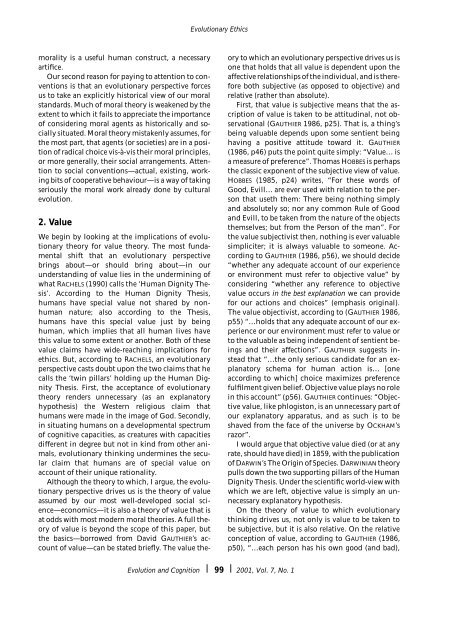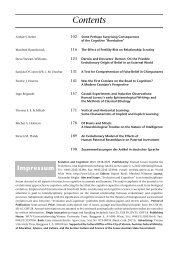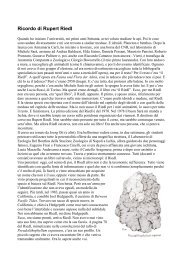The Seven Sins of Evolutionary Psychology - Konrad Lorenz Institute
The Seven Sins of Evolutionary Psychology - Konrad Lorenz Institute
The Seven Sins of Evolutionary Psychology - Konrad Lorenz Institute
Create successful ePaper yourself
Turn your PDF publications into a flip-book with our unique Google optimized e-Paper software.
<strong>Evolutionary</strong> Ethicsmorality is a useful human construct, a necessaryartifice.Our second reason for paying to attention to conventionsis that an evolutionary perspective forcesus to take an explicitly historical view <strong>of</strong> our moralstandards. Much <strong>of</strong> moral theory is weakened by theextent to which it fails to appreciate the importance<strong>of</strong> considering moral agents as historically and sociallysituated. Moral theory mistakenly assumes, forthe most part, that agents (or societies) are in a position<strong>of</strong> radical choice vis-à-vis their moral principles,or more generally, their social arrangements. Attentionto social conventions—actual, existing, workingbits <strong>of</strong> cooperative behaviour—is a way <strong>of</strong> takingseriously the moral work already done by culturalevolution.2. ValueWe begin by looking at the implications <strong>of</strong> evolutionarytheory for value theory. <strong>The</strong> most fundamentalshift that an evolutionary perspectivebrings about—or should bring about—in ourunderstanding <strong>of</strong> value lies in the undermining <strong>of</strong>what RACHELS (1990) calls the ‘Human Dignity <strong>The</strong>sis’.According to the Human Dignity <strong>The</strong>sis,humans have special value not shared by nonhumannature; also according to the <strong>The</strong>sis,humans have this special value just by beinghuman, which implies that all human lives havethis value to some extent or another. Both <strong>of</strong> thesevalue claims have wide-reaching implications forethics. But, according to RACHELS, an evolutionaryperspective casts doubt upon the two claims that hecalls the ‘twin pillars’ holding up the Human Dignity<strong>The</strong>sis. First, the acceptance <strong>of</strong> evolutionarytheory renders unnecessary (as an explanatoryhypothesis) the Western religious claim thathumans were made in the image <strong>of</strong> God. Secondly,in situating humans on a developmental spectrum<strong>of</strong> cognitive capacities, as creatures with capacitiesdifferent in degree but not in kind from other animals,evolutionary thinking undermines the secularclaim that humans are <strong>of</strong> special value onaccount <strong>of</strong> their unique rationality.Although the theory to which, I argue, the evolutionaryperspective drives us is the theory <strong>of</strong> valueassumed by our most well-developed social science—economics—itis also a theory <strong>of</strong> value that isat odds with most modern moral theories. A full theory<strong>of</strong> value is beyond the scope <strong>of</strong> this paper, butthe basics—borrowed from David GAUTHIER’s account<strong>of</strong> value—can be stated briefly. <strong>The</strong> value theoryto which an evolutionary perspective drives us isone that holds that all value is dependent upon theaffective relationships <strong>of</strong> the individual, and is thereforeboth subjective (as opposed to objective) andrelative (rather than absolute).First, that value is subjective means that the ascription<strong>of</strong> value is taken to be attitudinal, not observational(GAUTHIER 1986, p25). That is, a thing’sbeing valuable depends upon some sentient beinghaving a positive attitude toward it. GAUTHIER(1986, p46) puts the point quite simply: “Value… isa measure <strong>of</strong> preference”. Thomas HOBBES is perhapsthe classic exponent <strong>of</strong> the subjective view <strong>of</strong> value.HOBBES (1985, p24) writes, “For these words <strong>of</strong>Good, Evill… are ever used with relation to the personthat useth them: <strong>The</strong>re being nothing simplyand absolutely so; nor any common Rule <strong>of</strong> Goodand Evill, to be taken from the nature <strong>of</strong> the objectsthemselves; but from the Person <strong>of</strong> the man”. Forthe value subjectivist then, nothing is ever valuablesimpliciter; it is always valuable to someone. Accordingto GAUTHIER (1986, p56), we should decide“whether any adequate account <strong>of</strong> our experienceor environment must refer to objective value” byconsidering “whether any reference to objectivevalue occurs in the best explanation we can providefor our actions and choices” (emphasis original).<strong>The</strong> value objectivist, according to (GAUTHIER 1986,p55) “…holds that any adequate account <strong>of</strong> our experienceor our environment must refer to value orto the valuable as being independent <strong>of</strong> sentient beingsand their affections”. GAUTHIER suggests insteadthat “…the only serious candidate for an explanatoryschema for human action is… [oneaccording to which] choice maximizes preferencefulfilment given belief. Objective value plays no rolein this account” (p56). GAUTHIER continues: “Objectivevalue, like phlogiston, is an unnecessary part <strong>of</strong>our explanatory apparatus, and as such is to beshaved from the face <strong>of</strong> the universe by OCKHAM’srazor”.I would argue that objective value died (or at anyrate, should have died) in 1859, with the publication<strong>of</strong> DARWIN’s <strong>The</strong> Origin <strong>of</strong> Species. DARWINIAN theorypulls down the two supporting pillars <strong>of</strong> the HumanDignity <strong>The</strong>sis. Under the scientific world-view withwhich we are left, objective value is simply an unnecessaryexplanatory hypothesis.On the theory <strong>of</strong> value to which evolutionarythinking drives us, not only is value to be taken tobe subjective, but it is also relative. On the relativeconception <strong>of</strong> value, according to GAUTHIER (1986,p50), “…each person has his own good (and bad),Evolution and Cognition ❘ 99 ❘ 2001, Vol. 7, No. 1








